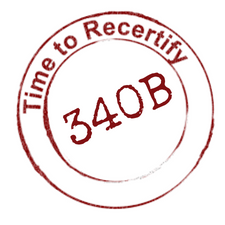All covered entities (CE) and child sites are required by the 340B statute, administered by HRSA, to recertify annually for the 340B program. Failure to do so, will result in removal from the 340B program. The 2018 recertification window runs from August 15, 2018 - September 12, 2018.
Cory Aubuchon
Recent Posts
Topics: 340B, 340B recertification, 340b compliance, 340B OPAIS
340B Corner: Capt. Pedley Testifies In 340B Program Government Hearing
Posted by Cory Aubuchon on Jun 22, 2018 12:07:25 PM
On Tuesday, June 19, 2018, the Senate HELP Committee held a hearing on the “Effective Administration of the 340B Drug Pricing Program”, featuring the testimony of only Captain Krista Pedley, Director of HRSA Office of Pharmacy Affairs. The theme of the hearing focused on HRSA’s oversight of the 340B program and the necessary data points needed to measure the program according to its Congressional intent.
Topics: 340B, Senate HELP
340B Corner: Senate HELP Committee Hearing on Drug Pricing Blueprint
Posted by Cory Aubuchon on Jun 21, 2018 10:23:56 AM
HHS Secretary, Alex Azar, appeared before the Senate HELP committee on Tuesday, June 12, 2018 to provide testimony regarding the details of the Trump Administration’s drug pricing blueprint. The hearing was more of a launching point to further the discussion on the topic of lowering drug costs. No definitive action plans were outlined, but a myriad of potential target areas were discussed.
Topics: 340B, Senate HELP
Overview of Worksheet S-10 Medicare Cost Report Instructions
Posted by Cory Aubuchon on Nov 4, 2015 9:00:00 AM
Worksheet S-10 hasn’t exactly been in the forefront of the Medicare cost reporting process as, other than EHR/HIT payments, Worksheet S-10 is not directly tied to reimbursement today. However, providers have been put on notice that CMS is eyeing a switch to S-10 as the distribution model for Uncompensated Care (UC) reimbursement in the future. Currently, the UC pool is allocated based on a proxy of low-income days (Factor 3). Yet verbiage from the most recent 2016 IPPS rule indicates that a change to this proxy is on the horizon:
Topics: S-10
2016 IPPS Proposed Rule Comment Letter Submitted to CMS
Posted by Cory Aubuchon on Jun 22, 2015 10:41:00 AM
The 2016 IPPS Proposed Rule for Acute Care Hospitals was put on display on April 17, 2015. All comments to the rule were to be submitted by June 16, 2015. As in past years, Southwest Consulting Associates (SCA) performed extensive analysis of the Proposed Rule and submitted detailed comments in response to CMS’ 2016 IPPS Notice of Proposed Rulemaking (NPRM). SCA’s comments primarily related to the proposed changes to the Payment Adjustment for Medicare Disproportionate Share Hospitals (DSH) including the Uncompensated Care (UC) payment component.
Topics: Medicare DSH Reimbursement, uncompensated care, Industry Updates, S-10
2016 IPPS Proposed Rule: Uncompensated Care Reimbursement
Posted by Cory Aubuchon on May 26, 2015 12:56:00 PM
The 2016 IPPS Proposed Rule was put on display on April 17, 2015. All comments to the rule are due by June 16, 2015. Below is SCA’s brief, yet detailed take on the impact to Uncompensated Care Reimbursement (UC).
Quick Review of the DSH Payment Under ACA
As a result of the ACA, the amount of total DSH reimbursement a provider may receive for discharges beginning October 1, 2013, is now based upon two components:
-
Empirically Justified Medicare DSH Payment
-
Uncompensated Care (UC) Payment
The Empirically Justified Medicare DSH Payment is 25% of what Medicare DSH would have been under the pre-ACA formula. More on that HERE!
Topics: Medicare DSH Reimbursement
Revised 2015 Exchange Enrollment Projections and Uncompensated Care
Posted by Cory Aubuchon on Nov 14, 2014 8:00:00 AM
Earlier this week, the Department of Health and Human Services (HHS) released a brief projecting that 2015 enrollment through insurances exchanges will fall short of the original goals. The Congressional Budget Office (CBO) projected exchange enrollment of 13 million in its April 2014 report. The updated HHS projections place enrollment between 9 and 9.9 million.
Link:
The concept of applying macro level projections of a new and politically charged healthcare system to actual reimbursement is faulty from the start. There are too many variables to accurately predict final enrollment numbers. Many providers commented on the 2014 and 2015 proposed IPPS rules as to the potential impact of using enrollment estimates and asked for a reconciliation process to true-up projections to actual numbers.
Impact on Providers:
Uncompensated Care Reimbursement: Meet Your Milestones
Posted by Cory Aubuchon on Oct 31, 2014 2:26:00 PM
In today’s DSH/Uncompensated Care (UC)
reimbursement world, Medicaid
In the past, hospitals reported Medicaid days on their as-filed cost report and typically revised their Medicaid days upon secondary/tertiary review to pick up retroactive eligibility determinations and additional DSH reimbursement. The revised days were usually settled by the MAC via audit, reopening or appeal.
Uncompensated Care Reimbursement: Factor 3 (Piece of the Pie)
Posted by Cory Aubuchon on Oct 27, 2014 8:00:00 AM
Under the Affordable Care Act, Medicare disproportionate share hospitals (DSH) will be reimbursed under an uncompensated care (UC) model. The amount of uncompensated care reimbursement received by a DSH is determined by 3 factors.
Factor 3 determines a qualifying DSH’s portion of the UC reimbursement pool (Factor 1 x Factor 2).
Definition:
a hospital-specific value that expresses the proportion of the estimated uncompensated care amount for each subsection (d) hospital...with the potential to receive DSH payments relative to the estimated uncompensated care amount for all hospitals estimated to receive DSH payments. - CMS
Uncompensated Care Reimbursement: Factor 2 (THE SKIM)
Posted by Cory Aubuchon on Oct 23, 2014 9:15:06 AM
Under the Affordable Care Act, Medicare disproportionate share hospitals (DSH) are reimbursed under an uncompensated care (UC) model. The amount of uncompensated care reimbursement received by a DSH is determined by 3 factors.
Factor 2 reduces the Uncompensated Care Pool (Factor 1) in conjunction with the changes in the uninsured rate.








